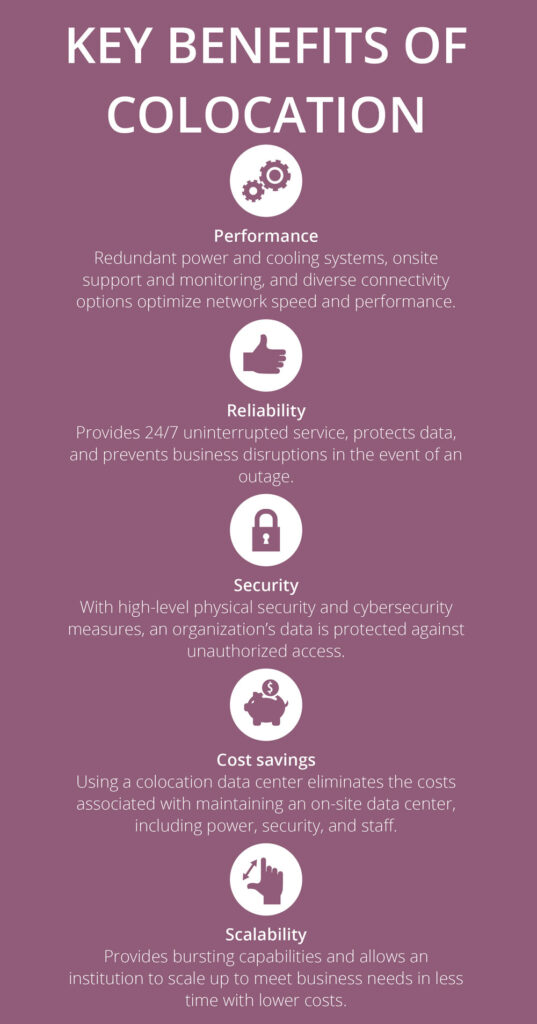Edge Colocation Services
In an age where data collection and analysis continue to grow in importance in nearly every industry, many organizations seek innovative and affordable ways to store data and expand their networking capabilities. In the education community, not every institution is equipped with a large IT infrastructure or the space to host servers, networking equipment, and data storage. To help address this need, Edge offers affordable colocation services where member institutions can receive data center support and colocation space for disaster recovery and business continuity. “Colleges and universities have always had the responsibility to design, build, and run data centers on college campuses,” says Bruce Tyrrell, Associate Vice President Programs & Services, Edge. “Unfortunately, the physical infrastructure, including commercial power, backup generators, and environmental services are extremely expensive and complex to deploy, especially in a typical college campus environment that was not designed for these requirements. Our colocation services are an enhancement of our members’ existing connectivity to the Edge network. By leveraging their existing last mile connections, members have the ability to place hardware at one of several locations around the region.”
With Edge maintaining high availability colocation data centers throughout the Northeast region, several members are choosing to exit the owned data center space and move their hardware to an off-campus location. “Many institutions are relocating hardware to a purpose-built facility that has been professionally engineered and constructed with the desired features,” says Tyrrell. “Access to these features is included in the monthly recurring costs for space outsourcing and using a colocation provider can help reduce the need for additional staff to handle the physical management of those environments.”


Benefits of Colocation
From their optical network, Edge can build connections for members from their campuses directly into the colocation facilities. “Member institutions can choose to place hardware infrastructure at the enterprise grade colocation facility on the campus of Montclair State University at a significant discount over commercial space,” explains Tyrrell. “Colocation is available along our optical network and provides access to 165 Halsey Street in Newark, New Jersey Fiber Exchange (NJFX), which is in Wall Township adjacent to the Tata international cable landing station, and at 401 N Broad Street in Philadelphia.
Members can also access the Digital Realty colocation at 32 Avenue, the Americas in Manhattan. Edge is expanding our colocation capability by adding the colocation facility at Data Bank in Piscataway, New Jersey, a bespoke water-cooled facility designed with High Performance Computing in mind.”
Colocation data centers allow members to store their equipment in a secure location with a public IP address, bandwidth, and power availability. These locations also include backup power in the event of an outage. “An organization can use Edge colocation services to extend their internal infrastructure into a professional collocation space from an end user point of view,” says Tyrrell. “The Edge model is unique in that the bandwidth provided to our members is not shared with any other organization, and since this extension is transparent, students, faculty, and staff do not realize their data is traveling off campus and out to a data center and back—the data transfer only takes microseconds.”
With Edge as the provider of the bandwidth, both internally connected to the campus, as well as externally via their internet connections, these connections are designed to scale and burst. “Unlike a cloud environment, where there is an increased cost for bursting when an organization’s computing resources reach their max, a colocation environment offers costs that are fixed,” explains Tyrrell. “An organization rents a cabinet and purchases hardware to store in this cabinet. Edge fixes the cost of transport and internet capacity which can allow for greater budget predictability. This is different from the Cloud, where once an application is placed in the Cloud, upticks in utilization for those apps can have a direct impact on the monthly expense to operate those services. For some institutions, having a fixed monthly budget for colocation services is easier to operationalize from a financial perspective.”
“Unlike a cloud environment, where there is an increased cost for bursting when an organization’s computing resources reach their max, a colocation environment offers costs that are fixed,” explains Tyrrell. “An organization rents a cabinet and purchases hardware to store in this cabinet. Edge fixes the cost of transport and internet capacity which can allow for greater budget predictability. This is different from the Cloud, where once an application is placed in the Cloud, upticks in utilization for those apps can have a direct impact on the monthly expense to operate those services. For some institutions, having a fixed monthly budget for colocation services is easier to operationalize from a financial perspective.”
— Bruce Tyrrell
Associate Vice President Programs & Services, Edge

Onboarding and Support
When an institution selects colocation services, Edge’s engineers help walk the member’s IT team through the ins and outs of the processes and can accompany them to colocation facilities to familiarize them with the data centers. “Edge acquires the space, coordinates the connectivity, and assists in providing remote and physically secured access to the cabinets or gauges,” says Tyrrell. “We also handle all the administrative pieces like billing and passing along clean invoices to the member. Since colocation facilities can often be complex and intimidating, Edge can visit the facilities with you during the onboarding process.”
“Colocation is a unique environment that can be complex from both an operational and an acquisition perspective,” continues Tyrrell. “Edge has decades of experience in operating these environments and we stand ready to assist our members with transitioning hardware and application into these professionally maintained tier three colocation facilities. Once the transition has been made, members are better positioned to weather the storms and unforeseen outage conditions that have been known to impact on campus data centers. This resilient infrastructure can provide peace of mind and a cost-friendly way to optimize resources and meet the growing demands of today’s higher education community.”
To learn more about Edge’s colocation services and how to take advantage of the latest and greatest developments in networking technology, visit njedge.net/solutions-overview/network-connectivity-and-internet2.
